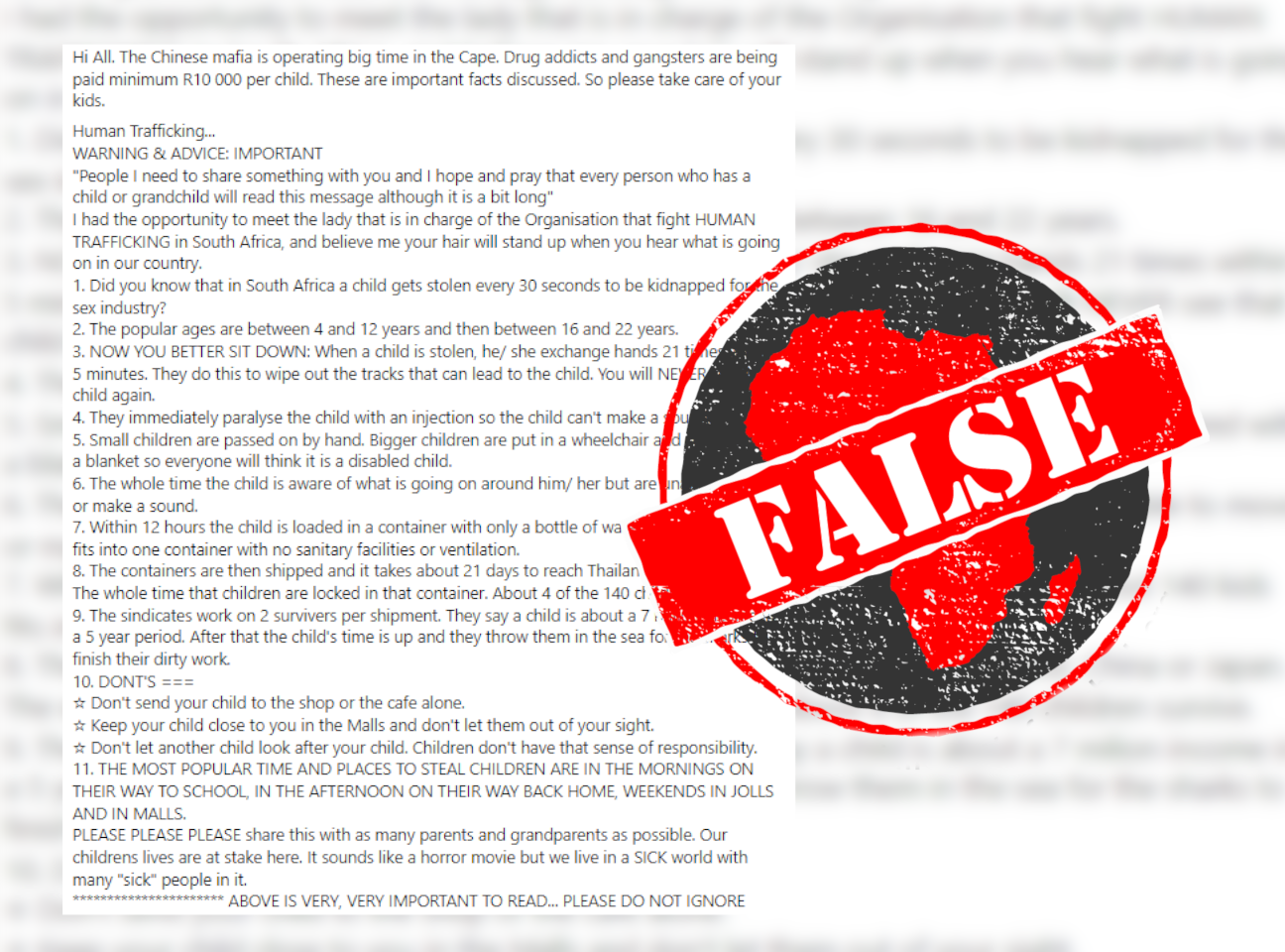A long list of claims about human trafficking has been repeatedly posted on Facebook and WhatsApp.
It says, among other things, that “in South Africa a child gets stolen every 30 seconds to be kidnapped for the sex industry”, that “the popular ages are between 4 and 12 years and then between 16 and 22 years”, and that containers of around 140 children are “shipped”, typically over 21 days, to “Thailand, China or Japan”.
The message blames “the Chinese mafia” for driving child trafficking, especially in South Africa’s Western Cape province.
Except the message is totally unsubstantiated and contradicts what is known about trends in child trafficking. Let’s explain.

Previously debunked numbers and unsubstantiated claims
One of the first claims in the post is that “in South Africa a child gets stolen every 30 seconds to be kidnapped for the sex industry”. This adds up to over 1 million children a year. But there is no data to support this figure.
Africa Check fact-checked the claim in 2018. At the time, the South African Police Service told us that 996 children had been reported missing in 2016 – far fewer than a million.
We have also previously debunked the claim that 1.2 million children are trafficked each year in South Africa. In a 2002 report on child labour, the International Labour Organisation (ILO) estimated that roughly 1.2 million children across the world were trafficked in the year 2000. Around 200,000 of those were trafficked from Africa.
The ILO acknowledged that its report contained “minimum estimates, based on conservative calculations”. It added that the difficulty of collecting data on trafficking, which is by nature difficult to study, meant the figure was likely inaccurate even when it was first calculated.
But with few other estimates of human trafficking, this estimate is regularly quoted, appearing for example in a 2007 Unesco report on human trafficking in South Africa, and in several ILO materials such as this 2010 brochure on child trafficking.
While the estimate is two decades old, it contradicts the claim that just over a million children are kidnapped each year in South Africa alone, to be forced into the sex trade.
Data on child trafficking sparse, but none supports the claims
Africa Check has debunked several claims about human trafficking. A recurring issue is that there’s little information on the subject. But what does exist contradicts the claims in the Facebook message.
For example, while the message claims that opportunistic kidnappings are extremely common, an ILO training manual for fighting human trafficking says this is not the case. The organisation writes that “instances of people being kidnapped or abducted into trafficking” are “much rarer than people commonly think”.
The ILO writes that trafficking typically begins when a child is recruited by someone with whom they have a “relationship of trust”. In the case of children this may be “someone from their own community, or the same ethnic group, who offers an introduction into a similar ethnic grouping in another place or country”.
The Counter Trafficking Data Collaborative (CTDC), which collects data from several international organisations, has recorded only 141 South African victims of human trafficking since 2005. This includes both adults and children, but only 1% of victims were aged zero to eight years, and only 5% were aged nine to 17.
The CTDC is not a comprehensive record of all human trafficking victims, but the limited information it offers contradicts the claims in the message.
According to the CTDC, South African citizens who were trafficked internationally were taken to 11 other countries, but 55% were exploited within South Africa. The most common country of exploitation was the United States of America. None of the recorded victims went to Thailand, China or Japan.
The CTDC also records that 0% of victims left South Africa by boat, with the most common forms of transport being car, air and bus. Only two-thirds travelled with another victim.
This suggests that if trafficking victims are “shipped” to China or Japan, this is not a common practice, as the message implies. “Generally internal trafficking will be done using various land forms of transport,” the ILO writes.
The trends the message describes are inaccurate. They do not reflect what is known about child trafficking.
Republish our content for free
For publishers: what to do if your post is rated false
A fact-checker has rated your Facebook or Instagram post as “false”, “altered”, “partly false” or “missing context”. This could have serious consequences. What do you do?
Click on our guide for the steps you should follow.
Publishers guideAfrica Check teams up with Facebook
Africa Check is a partner in Meta's third-party fact-checking programme to help stop the spread of false information on social media.
The content we rate as “false” will be downgraded on Facebook and Instagram. This means fewer people will see it.
You can also help identify false information on Facebook. This guide explains how.


Add new comment